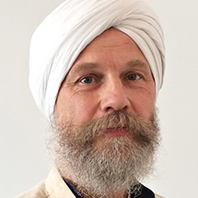by SS Hari Har Singh Burmeister, Hamburg, Germany
Summer 2014
Compassion starts with ourselves. As simple as this may sound, I have often found myself engaged in old inner beliefs of “I have to”, “I should not”, mixed with subtle nuances of shame and blame towards myself and others.
Our Master’s teachings—in all their high spirit and sacred intention—sometimes led me to more self-accusation. Sometimes we need to step out (at least in our mind) of old (inner) settings to be able to evolve. Sometimes a different approach helps.
I have found this new approach in the practice of Nonviolent Communication. Marshall Rosenberg, who was honored on Peace Prayer Day at 3HO Summer Solstice 2004 for his significant work for peace in the world, introduced a model and technique that allows us to step away from the “inner must,” replacing it with a more empathic approach to looking at what is alive within us without judgment or blame.
“The only beautiful thing which makes you human is compassion. You are worth nothing. Just think about it, think of vengeance, think of lies, think of truth, think of God, think of greatness, think of anything, take compassion out of it, you will find everything is bitter. Work it out. There is absolutely no grace without compassion.”—The Siri Singh Sahib (July 11, 1986)
The technical aspect focuses on learning to distinguish between our (real) needs and the strategies through which we try to get our needs fulfilled. It is important to note that “needs” and the attempt to fulfill them are understood as something positive—the negative connotation of “being needy” is not what is meant here. Marshall lovingly phrases this as “Everyone sings a beautiful song in each and every moment.”
Often our strategies are still painful and even harmful to ourselves and to others. However, once we have understood that our intention is always positive, we can be empathic with ourselves and stop blaming ourselves for repeating actions–actions which, despite the evidence that they have not contributed to our happiness, we haven’t been able to discard, as the samskaras in our mind are still too strong.
The reader may say here: “Well, he made his peace with his weaknesses, accepting them as given, and therefore stopped fighting or trying to get rid of them.” I found the opposite to be true. Self-compassion opens the door to initiate the change for a more fulfilling pattern where even supporting words (from ourselves or from those who love us) may not be strong enough to manifest this change.
Although yoga and meditation techniques and their transformative potential may be the key to a better future, still that self-loving attitude allows us to accept who we are today with all our weaknesses and shortcomings and to grow from there.
Patience Pays
 It takes time and patience. Change rarely comes overnight. I found myself falling into the same old pattern of frustration with myself, my spouse and the world when things did not go according to my design. And still, something has changed.
It takes time and patience. Change rarely comes overnight. I found myself falling into the same old pattern of frustration with myself, my spouse and the world when things did not go according to my design. And still, something has changed.
Where in the past I might have seen the other person as stupid or ignorant about what I obviously wanted or deserved to have or where I had been angry at myself, now I do not have to close my heart and myself off from life anymore.
In the moments when I slip back into old patterns, I now have the tools to find my way out again back into Life.
Compassion makes life much more enjoyable, both for myself and those around me.
About the Author
 SS Hari Har Singh Burmeister is an ordained Sikh Dharma Minister. Practicing Kundalini Yoga since 1979 and teaching since 1986, Hari Har Singh is a KRI-Teacher Trainer since 2010. He is married and has two children.
SS Hari Har Singh Burmeister is an ordained Sikh Dharma Minister. Practicing Kundalini Yoga since 1979 and teaching since 1986, Hari Har Singh is a KRI-Teacher Trainer since 2010. He is married and has two children.


